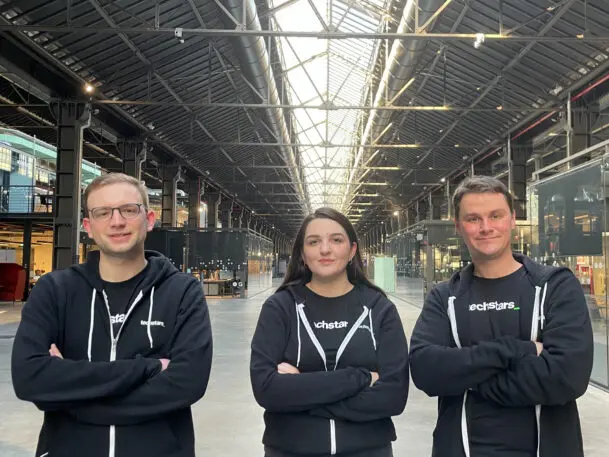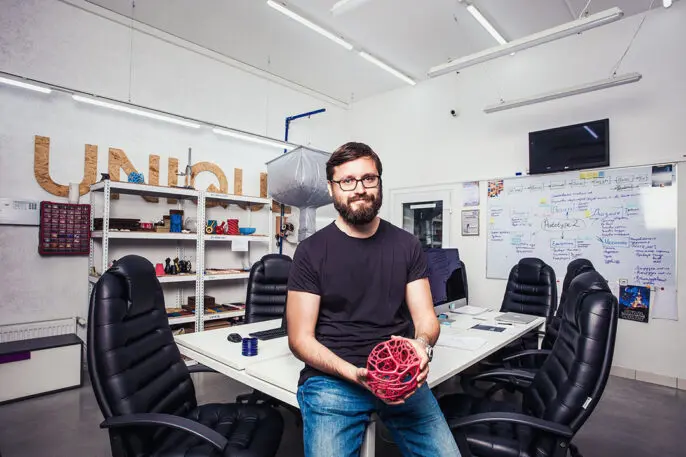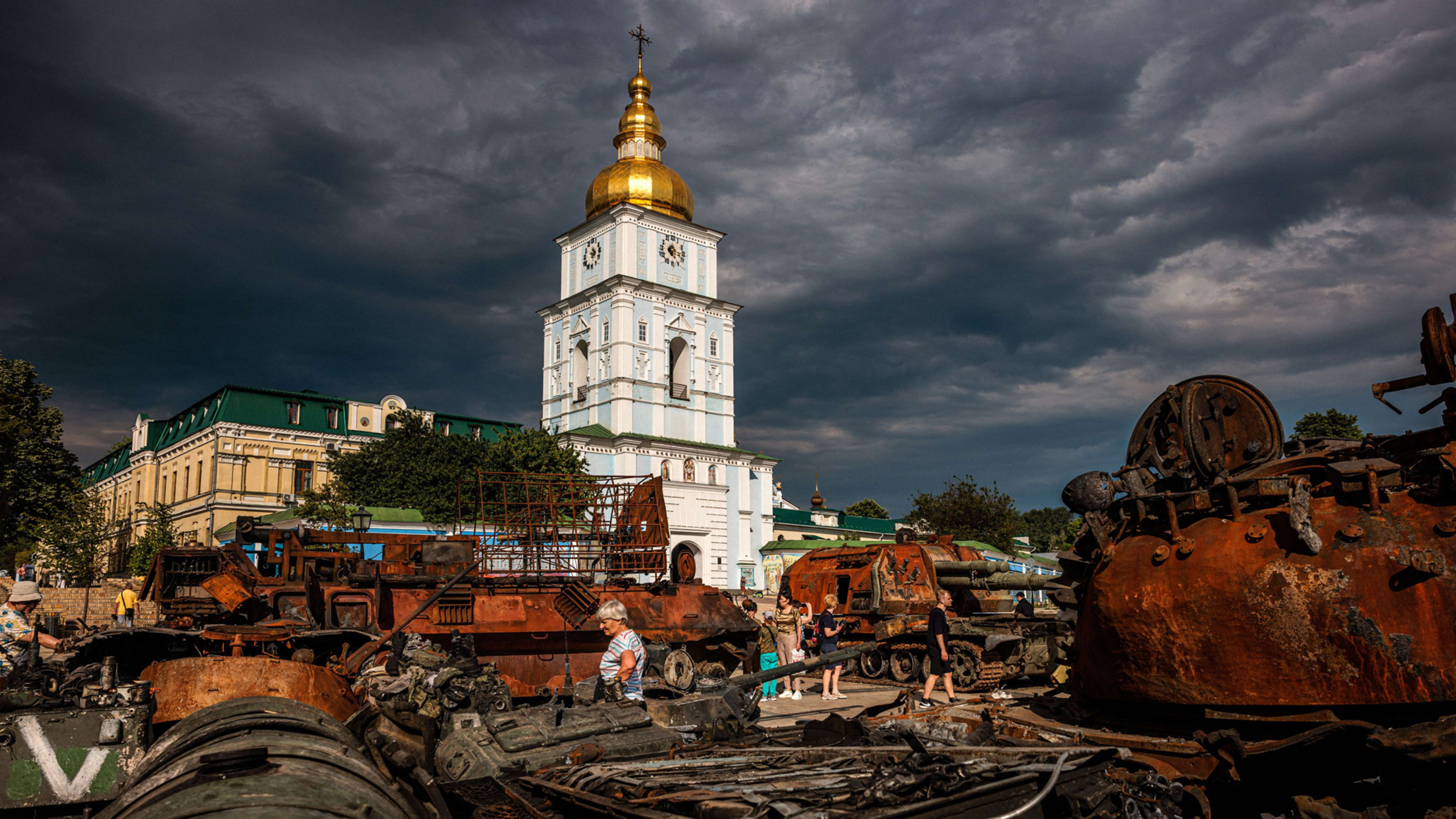In those first few fraught hours of February 24th, after Russian forces invaded Ukraine, Anastasiia Smyk, CEO and co-founder of aviation software startup Input Soft, recalls being in a state of shock and incredulity. She was in Kyiv at the time, but her 11-strong team was scattered around the country.
“The first week we were just thinking about how to survive at a human level,” says the 25-year-old entrepreneur. “So we decided to rent a house for our team in the Carpathian mountains, in the [safer] western part of Ukraine, and told them they could go there with their families to wait until we knew more about what was happening. Some of them went. Others were unable to get out.”
One of those left behind was the startup’s accountant, whose home town of Kherson, in southern Ukraine, has been under Russian occupation since early March. On May 3rd, when the internet and mobile communications went down, she decided to risk her life and make a break for it with her family. They couldn’t make it past Russian checkpoints at first, but finally succeeded after two days of trying. She now lives in central Ukraine, where she continues to work for Input Soft.
Anastasiia and her co-founder husband, Andrii, meanwhile, spent the early days of the war at his parents’ home in a village outside of Kyiv, where the sound of explosions was constant, as was the roar of warplanes overhead. While Andrii joined the territorial defense and worked 12-hour shifts at checkpoints, Anastassiia helped make food for evacuees, as well as molotov cocktails in anticipation of a Russian advance. A third co-founder, Valentyn, was picking up humanitarian aid from the Polish border, and delivering it to other cities.
After three weeks in effective limbo, with the situation deteriorating, they decided that Anastassiia would travel to Turin, Italy, where her company had been part of the Cities of the Future Techstars Accelerator, for the program’s demo day. Leaving Ukraine was far from straightforward, involving more than 30 hours of continuous travel—of trains repeatedly diverted due to missile attacks, endless military checkpoints, and crowds massing at the border. Finally Anastassiia arrived in Krakow, Poland, and from there, she flew to Turin, where she remains to this day.
Anastasiia has opted to stay in the northern Italian city, in large part because of the connections and peer network she forged during the program. “Everybody keeps in touch with me, including the program mentors and the three local Italian startups that were part of our cohort, so I feel a lot of support,” she says. “It would be impossible to find a better place to relocate to, and I will most certainly stay in Turin until [the war is over].”

As for working in Kyiv today, Anastasiia says that day-to-day life is slowly returning to a version of normality. Nevertheless, martial law introduced at the start of the war is still being strictly enforced. “There is a daily curfew and mandatory checkpoints around the city. There are also some everyday problems that Kyiv residents face now, such as the lack of fuel,” she says. “All gas stations give precedence to the military and volunteers, and it is much harder for civilians to fill up.” She adds that while there had been no attacks on Kyiv itself in recent weeks, on 5th June four rockets were fired at the capital, a reminder that danger is never far away.
Anastasiia’s story of personal and professional resilience is one I have heard repeatedly when speaking to some of the 100-plus Ukrainians, including founders and their teams, in the Techstars portfolio. The message I keep hearing—and it has made a deep impression on me, as someone who has worked in both Russia and Ukraine—is that the despite the self-evident dangers, these individuals are determined to keep building their companies in the knowledge that when the war is finally over, it will be tech entrepreneurs like them—the innovation they power, and the jobs they create—who will be instrumental in their country’s recovery.
“We all believe that this war will end soon with our victory,” says Anastasiia, “and then the Ukrainian tech community will come together to rebuild our country.” She points out that Ukraine’s buzzing startup scene is especially well-placed to play a major role in the country’s reconstruction due to the broad range of sectors and skills it encompasses. “We not only have product companies and software developers, but many work with hardware, and we also have startups in very important sectors, such as infrastructure and agriculture.”
She cites the Ukrainian government’s recent commitment to use the Ukrainian Startup Fund to offer microloans to companies that will, she says, “increase the country’s defense capabilities and facilitate its quick post-war reconstruction.” She plans to apply for a grant for Input Soft, which would allow them offer their platform for free to Ukrainian airports “after we win the war and begin rebuilding our aviation infrastructure.”
Though the founders I spoke with are eager to move onto the rebuild and reconstruction stage for their country, they’re clear-eyed about the difficulties ahead. Here are some of their stories, in their own words.
Vlodymyr Usov is co-founder of Kwambio, which produces 3D-printed ceramics on demand. Usov spoke to us from Kwambio’s facility in Odesa, Ukraine’s strategically crucial Black Sea port and logistics hub. The city has been a continuous focus of Russian bombardment.
“Odesa is in the southern part of Ukraine where the military operations are significantly intensified. Rockets, and missiles are hitting our buildings. Not only infrastructure, but actually buildings and houses where people are living, killing children, women and men. So it can happen tomorrow that one of the rockets will hit our factory. We’re going back and forth to the basement and then getting back to the facility, where we have a team of 15 people working. We had an air-raid warning siren about 30 minutes ago. But the terrible thing is that people, even in these harsh conditions, are getting used to it.

“In Odesa, a lot of young men are already part of the armed forces. But others are trying to work to support their teams, to actually generate revenues, to feed people and families around them. We can see that the war [probably] won’t end in a week or two from now. That’s why we need to relaunch the economy of Ukraine.”
Margarita Sivakova, is CEO and cofounder of Legal Nodes, a platform for founders to solve their cross-border legal tasks—built by legal experts-turned founders. Almost all of Legal Nodes’ remote team of 22, including Margarita’s two co-founders, are currently in Ukraine. Margarita was in Kyiv at the start of the war, but is now in London.
“My flight to London was at 11a.m on February 24th. Then the war started. We woke up to bombings and I received notifications that the airport was closed. We have this team chat on Telegram, and we received messages from everyone else on the team saying that they also heard bombings. That’s how we realized [the war] was not just in Kyiv, it was all over Ukraine, because our team is all over Ukraine.
“We [Margarita and her family] stayed in Kyiv for a day, and then started traveling to the [supposedly safer] western part of Ukraine; but even when we were leaving the city we didn’t know if it was safe or not to leave—two tanks near us suddenly started shooting. We were just stuck in traffic, and I didn’t know where they were shooting or whose tanks they were. Someone told me those are Ukrainian tanks shooting drones, and that calmed me down a little bit.
“The journey from Kyiv to the western part, which usually takes about seven hours, took 17 hours. Crossing the border was very tense. Everyone on the train was so scared that we might get turned around. But when the Hungarian border officers came on the train, they were so kind and so helpful.

“The benefit of being an online business is you can work from anywhere. We already have a lot of Ukrainian clients, but we always planned to scale globally. One of the reasons we applied to Techstars [Legal Nodes was on Techstars’s London accelerator 2021] was to scale into the UK and other markets. So when the war started, our six month [growth] plan got reduced to a month, and we just worked to ensure we got more international clients.”
Techstars CEO Maëlle Gavet has been a senior executive at numerous large tech companies around the world, including Ozon, the Priceline Group (OpenTable, Kayak, Booking.com), and Compass. She was also a Principal at the Boston Consulting Group for six years. She is the author of Trampled by Unicorns: Big Tech’s Empathy Problem and How to Fix It.
Recognize your brand's excellence by applying to this year's Brands That Matters Awards before the early-rate deadline, May 3.
